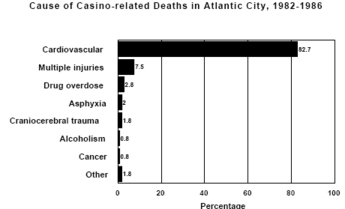During 1982-1986 a total of 398 casino-related deaths occurred in Atlantic City. Casino-related deaths were defined as “any sudden, unexpected, suspicious, violent, or traumatic death that (a) occurred on the premises of a casino, (b) involved an individual traveling to or from a casino, (c) occurred to a casino employee, or (d) occurred to an individual contracted to do work for a casino.” The primary cause of death was cardiovascular (82.7%), followed by multiple injuries (7.5%) and drug overdoses (2.8%). Eleven (2.8%) of the deaths were classified as suicidal, 5 (1.3%) as homicidal, and 52 (13.1%) of the deaths were directly related to transportation. Of the 69 toxicological screens performed, 37 (53.6%) were positive for ethanol and/or drugs. The pattern of casino-related deaths in this study was not contrasted with another population; therefore, it is difficult to determine cause and effect. For example, in the general population, cardiovascular disease also is the primary cause of non-accidental mortality. Regular gamblers experience increases in travel, excitement, exposure to smoke, food intake, and crowding, as well as changes in daily schedule. In addition, other patrons may be preoccupied with their own gambling and fail to either seek or provide medical assistance. For many different reasons, individuals who visit vacation resorts in general, and casinos in particular, may be at increased risk for cardiac attacks.
Source: Jason, D.R., Taff, M.L., & Boglioli, L.R. (1990). Casino-related deaths in Atlantic City, New Jersey, 19821986. The American Journal of Forensic Medicine and Pathology, 11(2), 112-123.
This public education project is funded, in part, by The Andrews Foundation and the Massachusetts Department of Public Health.
This fax may be copied without permission. Please cite The WAGER as the source.
For more information contact the Massachusetts Council on Compulsive Gambling, 190 High Street, Suite 6, Boston, MA 02110.





